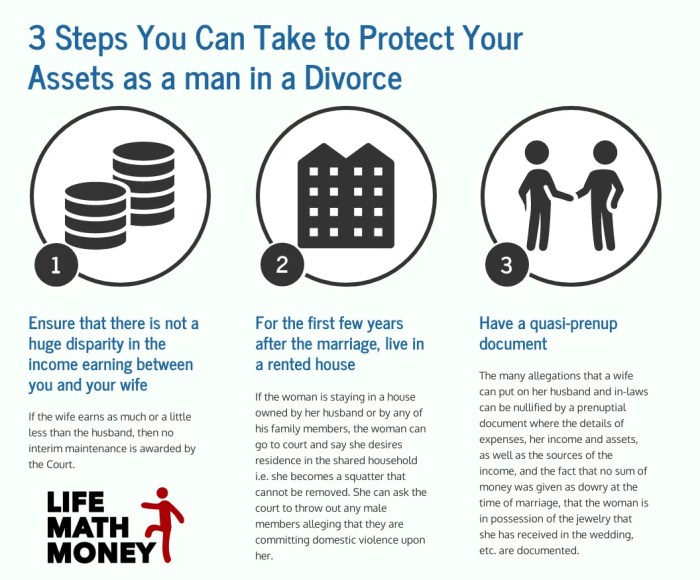How to protect my assets in a divorce? As this question takes center stage, we delve into a comprehensive guide that will equip you with the knowledge and strategies to safeguard your financial interests during this challenging time.
In this guide, we’ll explore legal considerations, financial strategies, estate planning techniques, and emotional and practical aspects of asset protection in divorce. Whether you’re anticipating a divorce or already in the process, this guide will empower you to make informed decisions and protect your financial well-being.
Identify and Value Assets
Identifying and valuing assets are critical in protecting them during a divorce. It ensures a fair distribution and prevents one party from hiding or undervaluing assets.
Methods for Identifying Assets
- Review financial statements, bank accounts, and investment portfolios.
- Create an inventory of tangible property, such as real estate, vehicles, and jewelry.
- Consider intangible assets, such as intellectual property, patents, and business interests.
Methods for Valuing Assets
- Obtain appraisals from qualified professionals for real estate, vehicles, and jewelry.
- Use market value for publicly traded stocks and bonds.
- Consider fair market value for privately held businesses and intangible assets.
Accurate asset valuation is essential to ensure equitable distribution during divorce proceedings. It helps prevent financial imbalances and protects the rights of both parties.
Legal Considerations
Understanding the legal implications of asset protection in divorce is crucial. Prenuptial and postnuptial agreements can safeguard assets acquired before or after marriage. Equitable distribution, a common legal principle, aims to divide marital assets fairly, considering factors like income, needs, and contributions. It’s essential to grasp property rights, ownership, and control of assets to navigate the complexities of divorce and protect your financial interests.
Prenuptial and Postnuptial Agreements, How to protect my assets in a divorce?
Prenuptial agreements, signed before marriage, establish how assets will be divided in case of divorce. They can protect premarital assets and limit financial obligations acquired during the marriage. Postnuptial agreements, created after marriage, serve similar purposes and can address changes in circumstances or unforeseen events.
Equitable Distribution
In most jurisdictions, equitable distribution governs asset division during divorce. This legal concept aims for a fair and just distribution of marital assets, not necessarily an equal one. Courts consider various factors, including the length of the marriage, earning capacities of both spouses, and non-monetary contributions to the marriage, such as childcare or homemaking.
Property Rights, Ownership, and Control
Understanding property rights, ownership, and control is vital. Assets acquired during marriage are generally considered marital property, subject to equitable distribution. However, separate property, such as inheritances or assets owned before marriage, may be excluded from division. Establishing clear ownership and control over assets can prevent disputes and ensure your interests are protected.
Financial Strategies: How To Protect My Assets In A Divorce?
Financial strategies can play a crucial role in protecting assets during a divorce. By understanding and implementing these strategies, individuals can safeguard their financial interests and minimize the impact of asset division.
Trusts
Trusts are legal entities that hold assets on behalf of beneficiaries. They can be used to protect assets from creditors, lawsuits, and, in some cases, from division during a divorce. There are various types of trusts, each with its own specific rules and benefits.
Protecting your assets in a divorce is crucial, but don’t overlook the importance of child custody arrangements. For comprehensive guidance on this matter, check out How to file for child custody? . By understanding the legal process and your rights, you can safeguard both your financial interests and your relationship with your children.
Remember, protecting your assets in a divorce also involves ensuring the well-being of your family.
- Revocable Trusts: These trusts allow the grantor (the person creating the trust) to retain control over the assets and make changes to the trust as needed. However, assets in a revocable trust may still be subject to division during a divorce.
- Irrevocable Trusts: These trusts are more difficult to change or terminate once they are created. Assets placed in an irrevocable trust are generally protected from division during a divorce, as the grantor has relinquished control over them.
Limited Liability Companies (LLCs)
LLCs are business entities that offer liability protection to their owners. When assets are held within an LLC, they are not considered personal assets and may be shielded from division during a divorce.
To effectively protect assets using an LLC, it is important to ensure that the LLC is properly established and maintained. This includes filing the necessary paperwork, keeping accurate financial records, and observing corporate formalities.
Joint Tenancy Ownership
Joint tenancy ownership is a form of ownership in which two or more people hold title to an asset jointly. In a joint tenancy, the asset is owned equally by all tenants, and upon the death of one tenant, their share automatically passes to the surviving tenants.
To safeguard your assets during a divorce, it’s crucial to be aware of your legal rights. What are the legal grounds for divorce in my state? Knowing the legal basis for divorce empowers you to make informed decisions that can help protect your financial interests and ensure a fair outcome in the division of assets.
While joint tenancy ownership can provide some protection against asset division during a divorce, it is important to note that it also creates a legal obligation between the tenants. This means that if one tenant incurs debt or engages in risky financial activities, the other tenants may be held liable.
Tax Implications and Legal Considerations
It is important to consider the potential tax implications and legal considerations associated with each financial strategy. Trusts, LLCs, and joint tenancy ownership all have different tax and legal consequences that should be carefully evaluated before implementation.
Protecting your assets during a divorce is crucial. Understanding foreclosure laws, particularly those specific to agricultural properties, can be essential. Foreclosure laws for agricultural can vary significantly from residential properties, so it’s vital to consult with an experienced legal professional who specializes in this area.
By safeguarding your assets and navigating the legal complexities of divorce, you can secure your financial future and protect what matters most.
Consulting with a qualified attorney and financial advisor can help individuals understand the legal and financial implications of these strategies and make informed decisions about protecting their assets during a divorce.
Protecting your assets in a divorce is crucial, but don’t forget about your children’s well-being too. If you need to adjust your child support order, consider seeking legal advice. How to modify a child support order? Remember, securing your financial interests should go hand in hand with ensuring your children’s needs are met.
Estate Planning
Estate planning is a crucial aspect of asset protection in the event of divorce or death. It allows individuals to control how their assets are distributed after they pass away.
Through estate planning, individuals can create wills and trusts to ensure their assets are distributed according to their specific wishes. Wills are legal documents that Artikel how an individual’s assets should be distributed upon their death. Trusts are legal entities that hold assets for the benefit of beneficiaries, providing flexibility and control over asset distribution.
Updating Estate Plans
It is essential to update estate plans regularly to reflect changes in marital status and asset ownership. In the event of a divorce, individuals should review their wills and trusts to ensure their former spouse is no longer listed as a beneficiary. Additionally, they should consider creating new estate planning documents to protect their assets from any future claims by their former spouse.
When getting a divorce, it’s important to consider how to safeguard your assets. One aspect to keep in mind is the potential impact on your property. If you own a condominium, it’s essential to understand foreclosure laws for condominiums . These laws can affect your rights and obligations if you default on your mortgage or fail to pay your condo fees.
By being informed about foreclosure laws, you can make informed decisions to protect your assets and avoid unnecessary financial risks during this challenging time.
Emotional and Practical Considerations

Protecting assets during a divorce can be an emotionally and practically challenging process. Feelings of guilt, shame, and fear can arise, making it difficult to navigate the legal and financial complexities involved. However, it is crucial to approach this process with a clear understanding of the emotional and practical considerations to ensure a fair and equitable outcome.
Effective communication is key in navigating the emotional complexities of divorce. Open and honest discussions with your spouse and attorneys about asset protection can help alleviate misunderstandings and foster a respectful environment. It is important to remember that both parties have a right to protect their financial interests while also considering the well-being of the family unit.
Professional Support
Seeking professional support from therapists or counselors can provide invaluable guidance in navigating the emotional challenges of divorce. They can offer a safe and confidential space to process feelings, develop coping mechanisms, and make informed decisions regarding asset protection.
When a divorce is on the horizon, it’s essential to safeguard your assets. But what if domestic violence is a factor? Understanding the legal consequences of such abuse is crucial. What are the legal consequences of domestic violence? Knowing your rights and options can empower you to protect yourself and your assets during this challenging time.
Summary
Protecting your assets in a divorce requires a multifaceted approach that encompasses legal, financial, and emotional considerations. By understanding your rights, implementing effective strategies, and seeking professional support when needed, you can navigate this complex process and emerge with your financial interests intact.
Common Queries
What is equitable distribution?
Equitable distribution is a legal principle that guides the division of marital assets during a divorce. It aims to divide assets fairly between the spouses, considering factors such as each spouse’s income, earning capacity, and contributions to the marriage.
Can I protect my assets with a prenuptial agreement?
Yes, a prenuptial agreement can help protect your assets acquired before marriage from being divided during a divorce. However, it’s crucial to have a valid prenuptial agreement drafted by an experienced attorney to ensure its enforceability.
What are the tax implications of transferring assets to a trust?
Transferring assets to a trust may have tax implications, depending on the type of trust and the assets involved. It’s essential to consult with a tax professional to understand the potential tax consequences before making any decisions.



